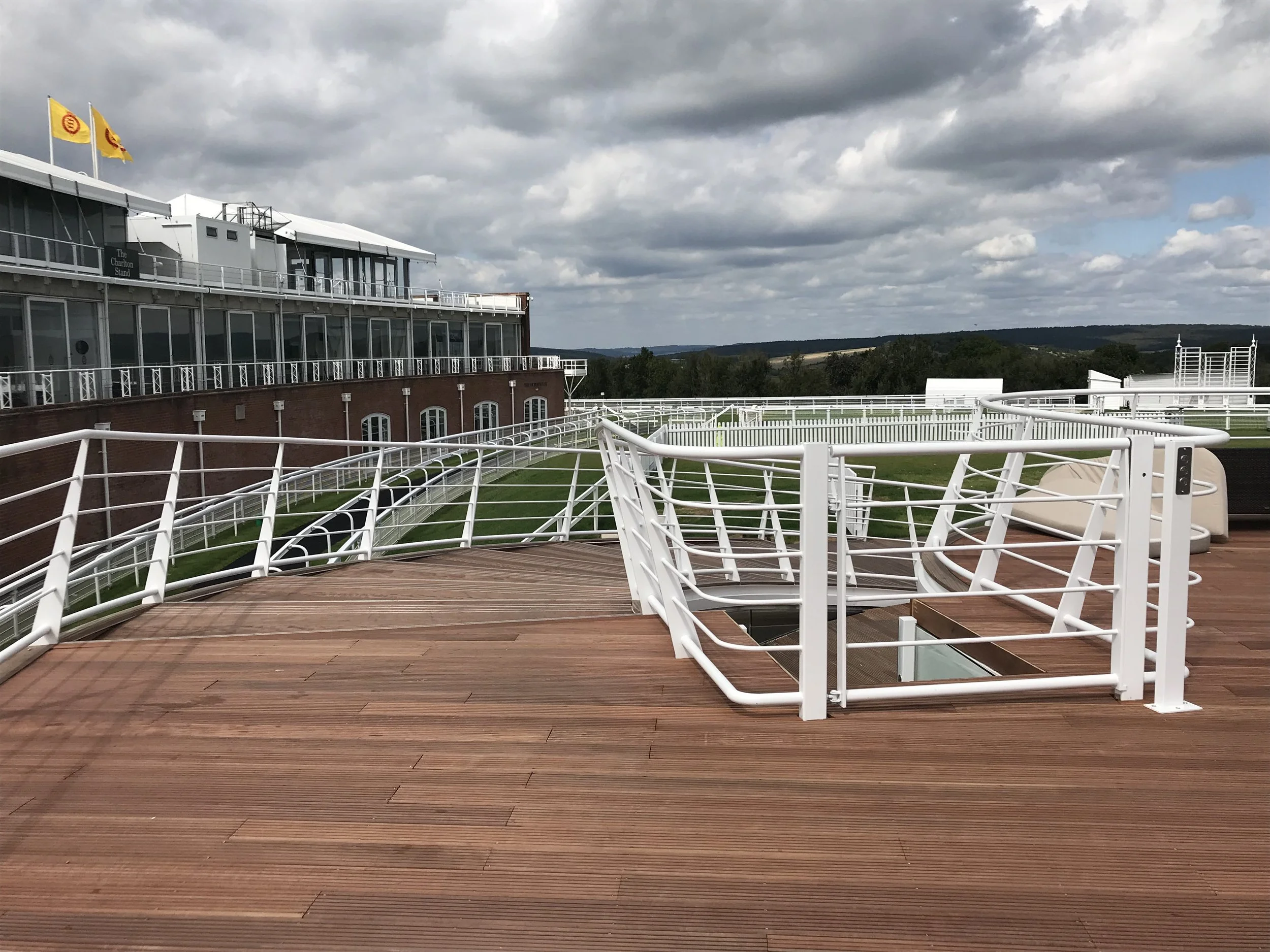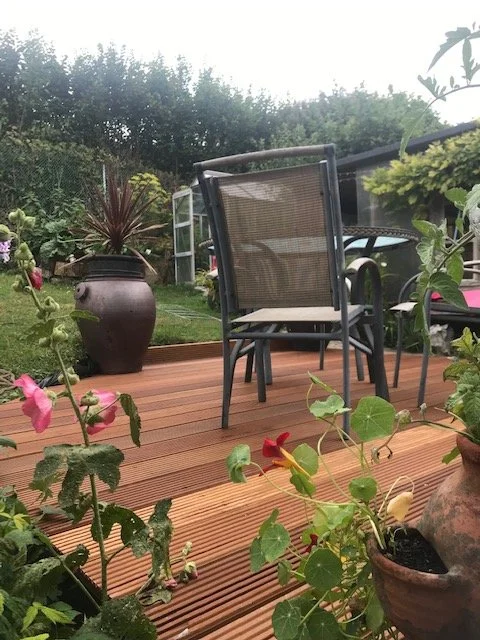Why choose hardwood decking?
Timber decking is sustainable, beautiful and versatile. Whether you want to deck around your home or underneath a pergola, create a new entertainment space or transform a sloping garden – decking can transform your outside space.
But why choose hardwood decking over other options?
Aesthetic qualities – hardwoods offer beautiful colour variations and grain. Although all species go grey with UV light exposure.
Softwood decks typically last 5-8 years. Any impregnated treatment will only permeate the outer 3-4mm of the cross-sectional area. If you don’t end seal the ends you’re exposing untreated non-durable timber, resulting in the decking boards rotting from the inside out! The natural durability of hardwoods mean they will generally have a much longer life (up to five times longer!), making them a very cost-effective option in the longer term.
Timber is one of very few building materials that is truly sustainable and renewable – helping meet Net Zero goals.
Hardwood decking can be recycled or re-used at the end of its life.
Easy to work and can be adapted quickly to suit on-site changes or repairs.
Dense and strong but lighter than stone/masonry.
Timber decks typically require less groundwork than patios, which means reduced trade time on site.
Tactile - a wooden deck is lovely to walk on with bare feet!
Hardwood species for decking
European Oak
Origin: Europe. Our oak comes from responsibly managed forests in France.
Description: A beautiful and classic choice of decking timber, oak is always a popular option (and rightly so!). Dense and durable, oak can withstand heavy foot traffic and exposure to the elements. It requires no treatment and is readily available. A cost-effective hardwood option which will look good for many years.
Longevity: Expected service life for deck boards – up to 30 years at 20mm thick.
Considerations: Oak has a high tannin content. During the first few months after the decking has been installed, tannin will exude from the boards, resulting in streaks and stains where it comes in to contact with masonry or render. Tannin also corrodes ferrous metal, so it is therefore important to use stainless steel fixings. It is worth noting that oak can tend to move slightly more than the tropical hardwood decking options. You may need to allow for a slightly larger gap between the boards.
Yellow Balau
Origin: Asia.
Description: A distinctive mixture of golden browns, light browns and pale reddish-browns, Yellow Balau is one of the best hardwoods for a deck. Widely available, Yellow Balau oozes tropical style, as well as having great technical performance. The timber is hard, stable and strong, with exceptional water resistance, making it an ideal choice for a pool-side deck.
Longevity: Expected service life for deck boards – up to 40 years based on 21mm thick boards.
Considerations: PHND (pin hole no defect) means this timber may have naturally occurring pin holes which are not a defect.
Ekki
Origin: West Africa.
Description: Extremely heavy and dense hardwood with a lovely reddish to dark brown appearance. Rated as very durable, Ekki weathers well and has good resistance to insect attacks.
Longevity: Desired service life for deck boards – up to 50 years at 21mm thick.
Considerations: Very difficult to work with hand tools but it’s durability makes it worth the effort. Ekki is used mainly in commercial settings where there are high traffic areas and heavy footfall.
Iroko
Origin: Africa.
Description: Referred to as ‘African teak’, iroko is beautiful, exceptionally strong, dense and scratch-resistant. The timber varies in colour from stunning, warm yellows and golds to honey and rich darker browns. Iroko produces its own natural oils, which make it resistant to insect attack and decay. Perfect for those in search of a high-end tropical look, with fantastic technical properties.
Longevity: Expected service life for deck boards – up to 40 years based on 20mm thickness.
Considerations: Iroko will have colour variation, so don’t expect a very uniform appearance.
Yellow Balau decking
Aspects to consider when selecting your hardwood timber decking
Appearance: Each hardwood offers a different aesthetic, so choose the timber that best suits the style of the property and your personal taste.
Decking Profiles: Different decking profiles will have an impact on the appearance and also on the performance of your deck, so take time to select the right profile for your project. At WL West we offer a range of standard profiles (including smooth, grooved and reeded) to choose from, as well as the option to create bespoke profiles designed to suit your individual needs.
Durability: The service life of a deck is determined by the durability or resistance to fungal decay and moisture of the different timber components used. Hardwood timbers will generally have a much longer service life than softwood timber and require less treatment. Use hardwood undercarriage or aluminium box sections for commercial settings for increased longevity.
Footfall: A dense hardwood will cope better with high footfall, being more hardwearing and resilient to impact.
Movement: Hardwood timber species have different degrees of movement, so you will need to follow the recommended installation guidance. Installing timber when wet can lead to issues – the moisture content of decking timber should be 20% or less.
Upkeep: Hardwood decking is generally low maintenance. It is usually recommended that you give your decking a coating of deck oil annually. Some UV oils will sometimes also contain an added grip feature.
Responsible Timber Sourcing: Use a reputable supplier to ensure the timber is legal and sustainable. As members of Timber Development UK we are signatories to the mandatory Responsible Purchasing Policy which is audited annually. By completing this process, it meets our responsibility under the UK Timber Regulations to prove the legality of the timber that we supply.
Planning and Building Regulations: All commercial decks require a structural engineering submission and consent from the Local Authority. Private decks are considered permitted development, not requiring local council planning consent – however the rules do vary. The local council planning department must always be contacted if the house where the deck is to be built is in any of the following: a Conservation Area, a National Park, an Area of Outstanding Natural Beauty, a World Heritage Site, the Norfolk or Suffolk Broads.
At WL West we offer a range of fabulous hardwood decking options, available in standard or bespoke profiles to meet your unique project requirements. Whatever your hardwood needs, we’re here to help you find the right decking solution. We also manufacture a range of outdoor living products, including pergolas and bespoke oak outdoor furniture. In addition, our fencing and gate division, PRO Fencing, have over 50 years’ experience in the supply and fit of a huge range of fencing and gates.
Simply contact our expert team for decking advice or a quote. Fill out a Contact Us form or call us on 01798 861611.


